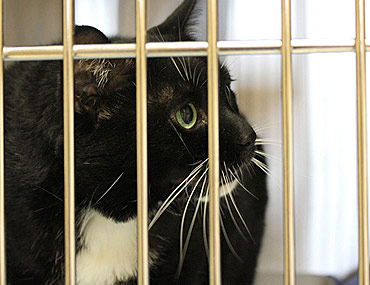Overview
A sebaceous cyst can develop when a hair follicle or skin pore gets blocked by dirt, debris, or scar tissue, or as the result of an infection. Our pets, like us, have microscopic oil glands that produce sebum. These glands are called sebaceous glands. Sebum is the oil that keeps hair nice and shiny, but sometimes this oil can become thick and clog skin pores and hair follicles, as well.
Sebaceous cysts are basically very large pimples that are usually harmless to your pet. If left alone, they could resolve without treatment, but many tend to recur. All dogs and cats can get sebaceous cysts, whether purebred or not. The cysts look like enclosed small bumps that stay whitish in color and are raised from the skin. When touched, they feel like small circular or oval lumps under the skin.
 Symptoms
Symptoms
If your pet has a sebaceous cyst, you will notice a raised bump. It may seem white or slightly blue in color. If it bursts, it will ooze a grayish white, brownish, or cottage-cheese-like discharge. These cysts usually develop on the head, neck, torso, or upper legs.
Diagnosis/Treatment
While sebaceous cysts are benign, they may be difficult to distinguish from other lumps and bumps that could be cancerous. In situations where your veterinarian may be concerned about the cyst, he or she may recommend a fine-needle aspiration of the cyst to identify its contents, or even surgical removal and further diagnostics, such as biopsy. Sometimes, conservative therapy with antibiotics, anti-inflammatory drugs, or other medications may be recommended. Other indications for cyst removal include infection, inflammation, or rupture of contents, which can be associated with a significant amount of bleeding and pus-like discharge.
Prevention
Caring for your pet’s skin and coat as recommended by your veterinarian can help reduce the chance of sebaceous cysts forming. Make sure to discuss the right skin/coat care for your pet; overbathing can be just as problematic as not bathing enough, and all breeds of dogs and cats differ!
If you have any questions or concerns, you should always visit or call your veterinarian – they are your best resource to ensure the health and well-being of your pets.
